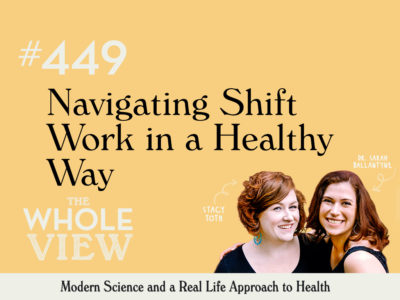This week on The Whole View podcast, Stacy and I answer listener Sophie’s question about shift work, especially alternating between days and nights. We share tons of science-backed tips for how to support circadian rhythm shifts, whether that’s switching shifts, traveling across time zones, or having to set the clocks forward for Daylight Savings Time! Yes, that means talking zeitgebers (my favorite German word, meaning “time giver”), but also nutrients, melatonin supplementation, and symptom management for those inevitable tired days when we do have to adjust to a new time zone or schedule! I also share some new research looking at how dietary macronutrient ratios impact the peripheral circadian clock and why respecting the overnight fast can be so helpful.
Table of Contents[Hide][Show]
If you enjoy the show, please review it on iTunes!
Recommended Reading and Listening
- TPV Podcast Episode 386: Intermittent Fasting
- TPV Podcast Episode 381: Is Breakfast the Most Important Meal of the Day?
- TPV Podcast, Episode 314: Is Melatonin Safe?
- Regulating Circadian Rhythm (and why that’s important)
- TPV Podcast Episode 399: What’s the Deal with Those Funny Amber Glasses?
- 5 Biohacks for Better Sleep
- The New Science of Sleep-Wake Cycles (and How to Improve Yours!)
- Is Breakfast The Most Important Meal of the Day? New Science Has Answers!
- Intermittent Fasting: Secret to Weight Loss or Dangerous Fad?
Citations
Hirao A, Tahara Y, Kimura I, Shibata S. A balanced diet is necessary for proper entrainment signals of the mouse liver clock. PLoS One. 2009 Sep 7;4(9):e6909. doi: 10.1371/journal.pone.0006909. PMID: 19738906; PMCID: PMC2734168.
Tahara Y, Shibata S. Entrainment of the mouse circadian clock: Effects of stress, exercise, and nutrition. Free Radic Biol Med. 2018 May 1;119:129-138. doi: 10.1016/j.freeradbiomed.2017.12.026. Epub 2017 Dec 23. PMID: 29277444.










